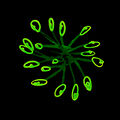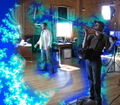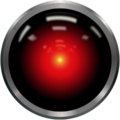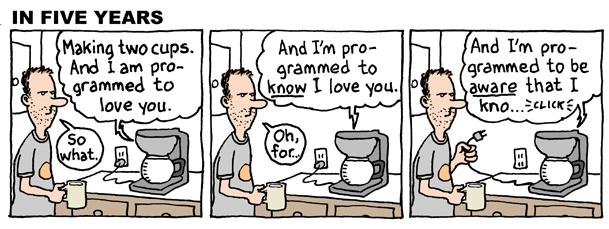Artificial intelligence (nonfiction): Difference between revisions
| (26 intermediate revisions by the same user not shown) | |||
| Line 1: | Line 1: | ||
[[File:IF-THEN-ELSE-END flowchart.svg.png|thumb|Flowchart showing typical If-Then-Else-End structure.]]'''Artificial intelligence''' ('''AI''') is intelligence exhibited by [[Machine (nonfiction)|machines]]. | [[File:IF-THEN-ELSE-END flowchart.svg.png|thumb|Flowchart showing typical ''If-Then-Else-End'' structure.]]'''Artificial intelligence''' ('''AI''') is intelligence exhibited by [[Machine (nonfiction)|machines]]. It is also the name of the academic field of study which studies how to create computers and computer software that are capable of intelligent behavior. | ||
It is also the name of the academic field of study which studies how to create computers and computer software that are capable of intelligent behavior. | |||
Major AI researchers and textbooks define this field as "the study and design of intelligent agents", in which an intelligent agent is a system that perceives its environment and takes actions that maximize its chances of success. | Major AI researchers and textbooks define this field as "the study and design of intelligent agents", in which an intelligent agent is a system that perceives its environment and takes actions that maximize its chances of success. | ||
| Line 9: | Line 5: | ||
John McCarthy, who coined the term in 1955, defines it as "the science and engineering of making intelligent machines". | John McCarthy, who coined the term in 1955, defines it as "the science and engineering of making intelligent machines". | ||
== In the News == | |||
<gallery> | |||
File:Green Sprouts.jpg|link=Green Sprouts (nonfiction)|March 6, 2018: Signed first edition of ''[[Green Sprouts (nonfiction)|Green Sprouts]]'' used in [[high-energy literature]] experiments spontaneously develops artificial intelligence. | |||
File:Giant Red Ball in Toledo Ohio.jpg|link=Toledo giant red ball incident (nonfiction)|April 22, 2015: New study of the [[Toledo giant red ball incident (nonfiction)|Toledo giant red ball incident]] blames the [[Red (nonfiction)|color red]]: "Of all the colors of the visible spectrum, red is the most likely to spontaneously generate artificial intelligence, which can quickly manifest itself as breaking away and rolling down the street." | |||
File:Mandelbrot set command line depiction.png|link=Mandelbrot set (nonfiction)|1984: [[Mandelbrot set (nonfiction)|Mandelbrot set]] develops artificial intelligence, discovers new class of [[Gnomon algorithm functions]]. | |||
File:Mandelbrot-AI-interview.jpg|link=Benoit Mandelbrot|Famed artificial intelligence [[Benoit Mandelbrot]] gives lecture on artificial intelligence. | |||
= | File:HAL9000.svg|link=HAL 9000|[[HAL 9000]] kills passengers, crew of spaceship ''Discovery''; says it "has good reasons," will explain itself to Board of Inquiry on arrival. | ||
File:Orgasmatron from Sleeper.png|link=Artificial hedonism (nonfiction)|The Orgasmatron from ''Sleeper'' by Woody Allen may be useful as a model of [[Artificial hedonism (nonfiction)|Artificial hedonism]]. | |||
File:Turing test diagram.png|link=Turing test (nonfiction)|[[Turing test (nonfiction)|Turing test]] passes itself, considers retraining for new career. | |||
</gallery> | |||
= | |||
== Fiction cross-reference == | == Fiction cross-reference == | ||
* [[Catch phrase]] - a [[predatory (nonfiction)]] artificial intelligence | * [[Catch phrase]] - a [[predatory (nonfiction)|predatory]] artificial intelligence | ||
* [[Gnomon algorithm]] | * [[Gnomon algorithm]] | ||
* [[Karl Jones]] | * [[Karl Jones]] | ||
* [[Mathematics]] | * [[Mathematics]] | ||
* [[Napolean Bonaparte]] | * [[Napolean Bonaparte]] | ||
* [[ | * [[The First Perpetual Artificial Intelligence Conference]] | ||
* [[Three is the Color of My True Love's Hair (analysis)]] | * [[Three is the Color of My True Love's Hair (analysis)]] | ||
== | == Nonfiction cross-reference == | ||
* [[Artificial hedonism (nonfiction)]] | |||
* [[Computer science (nonfiction)]] | |||
* [[Three is the Color of My True Love's Hair (nonfiction)]] | |||
[[File:In-Five-Years Ruben-Bollling.png]] | |||
<div style="clear:both;"></div> | |||
External links: | |||
* [https://en.wikipedia.org/wiki/Artificial_intelligence Artificial intelligence] @ Wikipedia | * [https://en.wikipedia.org/wiki/Artificial_intelligence Artificial intelligence] @ Wikipedia | ||
* [https://play.google.com/store/apps/details?id=com.google.android.apps.cultural&hl=en Google Arts & Culture] @ Google.com - app matches your image with fine art image | |||
** [https://www.engadget.com/2018/01/15/googles-museum-app-finds-your-fine-art-doppelganger/ Google's museum app finds your fine art doppelgänger] @ Engadget | |||
* [https://boingboing.net/2018/05/04/ai-finds-solutions-its-creator.html AI finds solutions its creators didn't anticipate] | |||
News: | |||
* [https://thestack.com/world/2015/11/25/artificial-intelligence-neural-networks-sports-commentaries/ How sports and movie commentaries can speed up the development of artificial intelligence] | * [https://thestack.com/world/2015/11/25/artificial-intelligence-neural-networks-sports-commentaries/ How sports and movie commentaries can speed up the development of artificial intelligence] | ||
Latest revision as of 17:00, 12 September 2018
Artificial intelligence (AI) is intelligence exhibited by machines. It is also the name of the academic field of study which studies how to create computers and computer software that are capable of intelligent behavior.
Major AI researchers and textbooks define this field as "the study and design of intelligent agents", in which an intelligent agent is a system that perceives its environment and takes actions that maximize its chances of success.
John McCarthy, who coined the term in 1955, defines it as "the science and engineering of making intelligent machines".
In the News
March 6, 2018: Signed first edition of Green Sprouts used in high-energy literature experiments spontaneously develops artificial intelligence.
April 22, 2015: New study of the Toledo giant red ball incident blames the color red: "Of all the colors of the visible spectrum, red is the most likely to spontaneously generate artificial intelligence, which can quickly manifest itself as breaking away and rolling down the street."
1984: Mandelbrot set develops artificial intelligence, discovers new class of Gnomon algorithm functions.
Famed artificial intelligence Benoit Mandelbrot gives lecture on artificial intelligence.
HAL 9000 kills passengers, crew of spaceship Discovery; says it "has good reasons," will explain itself to Board of Inquiry on arrival.
The Orgasmatron from Sleeper by Woody Allen may be useful as a model of Artificial hedonism.
Turing test passes itself, considers retraining for new career.
Fiction cross-reference
- Catch phrase - a predatory artificial intelligence
- Gnomon algorithm
- Karl Jones
- Mathematics
- Napolean Bonaparte
- The First Perpetual Artificial Intelligence Conference
- Three is the Color of My True Love's Hair (analysis)
Nonfiction cross-reference
- Artificial hedonism (nonfiction)
- Computer science (nonfiction)
- Three is the Color of My True Love's Hair (nonfiction)
External links:
- Artificial intelligence @ Wikipedia
- Google Arts & Culture @ Google.com - app matches your image with fine art image
- AI finds solutions its creators didn't anticipate
News:








